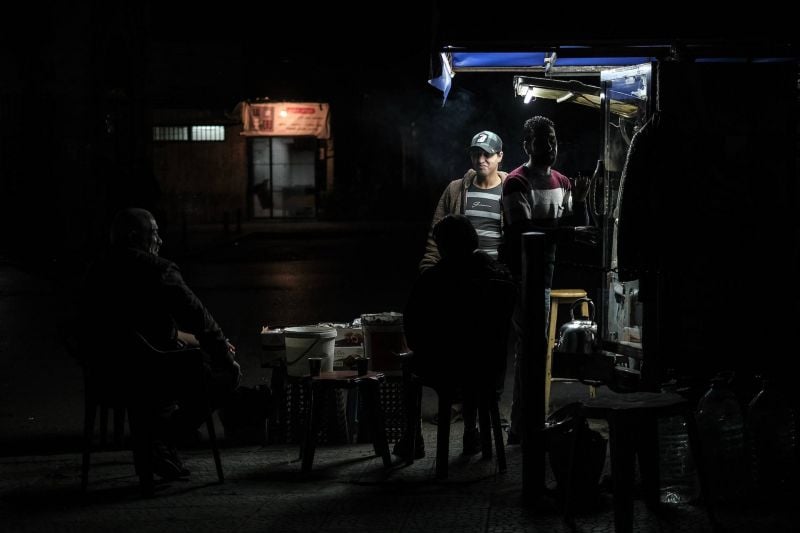
People eat their iftar after sunset on a Tripoli street. (Credit: João Sousa/L'Orient Today)
TRIPOLI — “You think you know anything about Ramadan?” jabs sweets vendor Wassim Tabboush, pouring dollops of qatayef dough onto a smoking stove. “In Ramadan, we would never close.” The 35-year-old puts down his metal can to open a childhood memory.
“In the last weeks of Ramadan, smells of maamoul, boiling sugar and ghee wafted out of everyone’s windows and serenaded the souk corridors,” he reminisces of the 1990s. “Iftar tables had dozens of different dishes from generous neighbors wanting nothing but a reaction to the taste.”
“It was impossible to have a conversation with a sweets salesman.” He dries the cooked qatayef. “Now look, we can talk for hours,” he quips, hinting at the low sales that pinch harder this year than ever before.
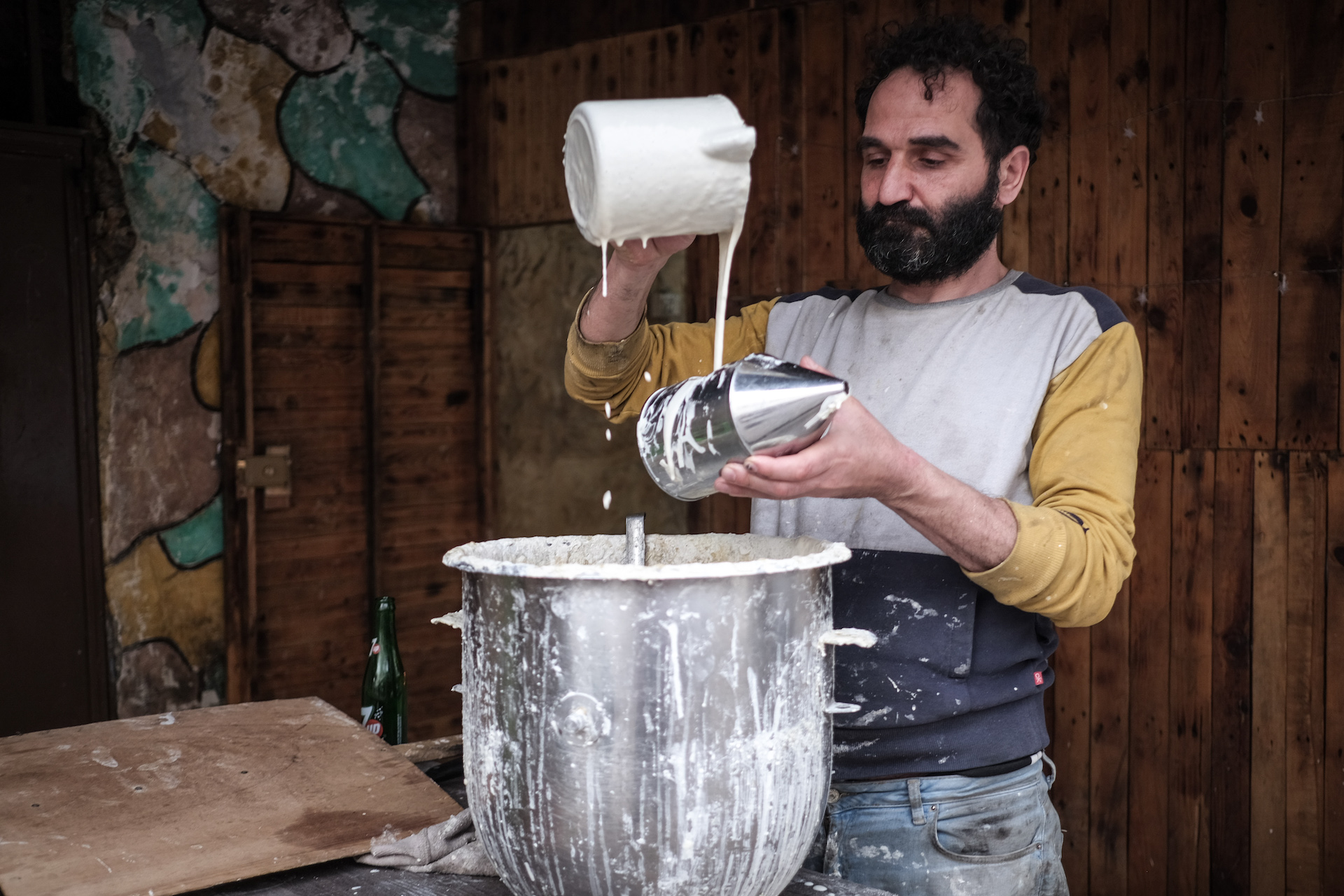 Wassim Tabboush refills the can of qatayef dough. He’ll be breaking his fast with the company of his employer. (Credit: João Sousa/L'Orient Today)
Wassim Tabboush refills the can of qatayef dough. He’ll be breaking his fast with the company of his employer. (Credit: João Sousa/L'Orient Today)
Just steps away from Wassim’s dying daydream, 15-year-old Adam Housari carries a tied nylon bag weighed down by Tripoli’s special Ramadan licorice drink, sharab al-sous. The black liquid is cheap enough to remind him of the taste of sugar this holy month.
It’s a week before Eid and the youngest of seven says that this is the first year he will spend the day of festivities at home. Barricaded by the embarrassment of wearing last year’s too-tight Eid shirt, he plans on opening the living room window to let in the echoes of live music playing from the city center.
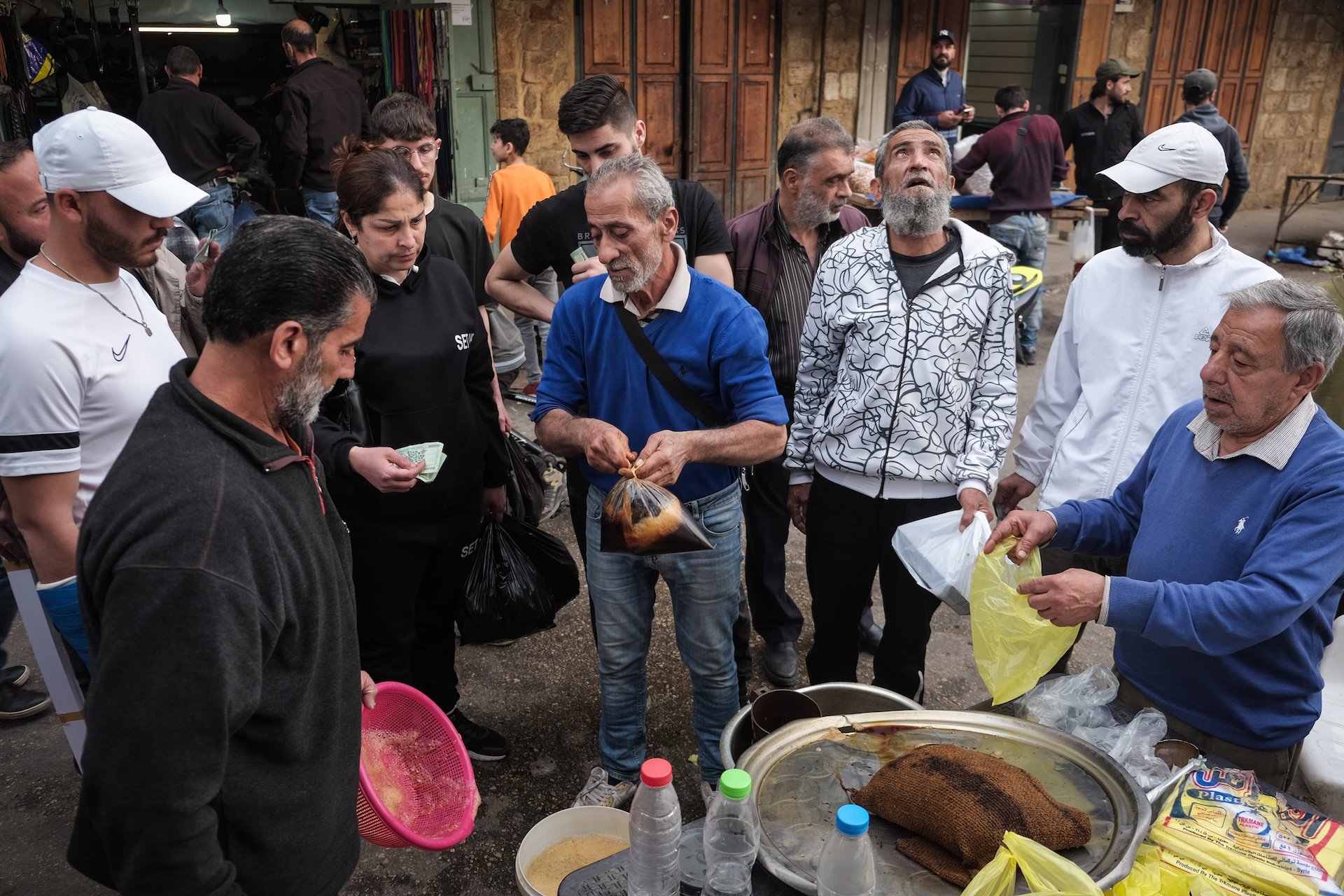 Residents of Beb al-Ramel gather around the vendor selling sharab al-sous. (Credit: João Sousa/L'Orient Today)
Residents of Beb al-Ramel gather around the vendor selling sharab al-sous. (Credit: João Sousa/L'Orient Today)
Instead of new clothes, his father Salim is buying some meat for a brothy rice and bean stew to break the monotony of eating fried potatoes and fatteh for iftar almost every day this holy month.
Like many others, the family has also severely cut down on meat and chicken as prices have skyrocketed higher than Salim could afford, splitting his family of nine into separate homes for iftar to share the burden of feeding the children.
Inelastic economy
Since the 2019 banking crisis, those at the lower end of Lebanon’s economic spectrum have plunged into poverty as the official currency spiraled. While the country has adjusted to the crisis by dollarizing the market and salaries, those still stuck earning their income in Lebanese lira have less purchasing power than ever. “We have normalized the crisis,” says economist and Lebanese American University (LAU) professor Layal Mansour.
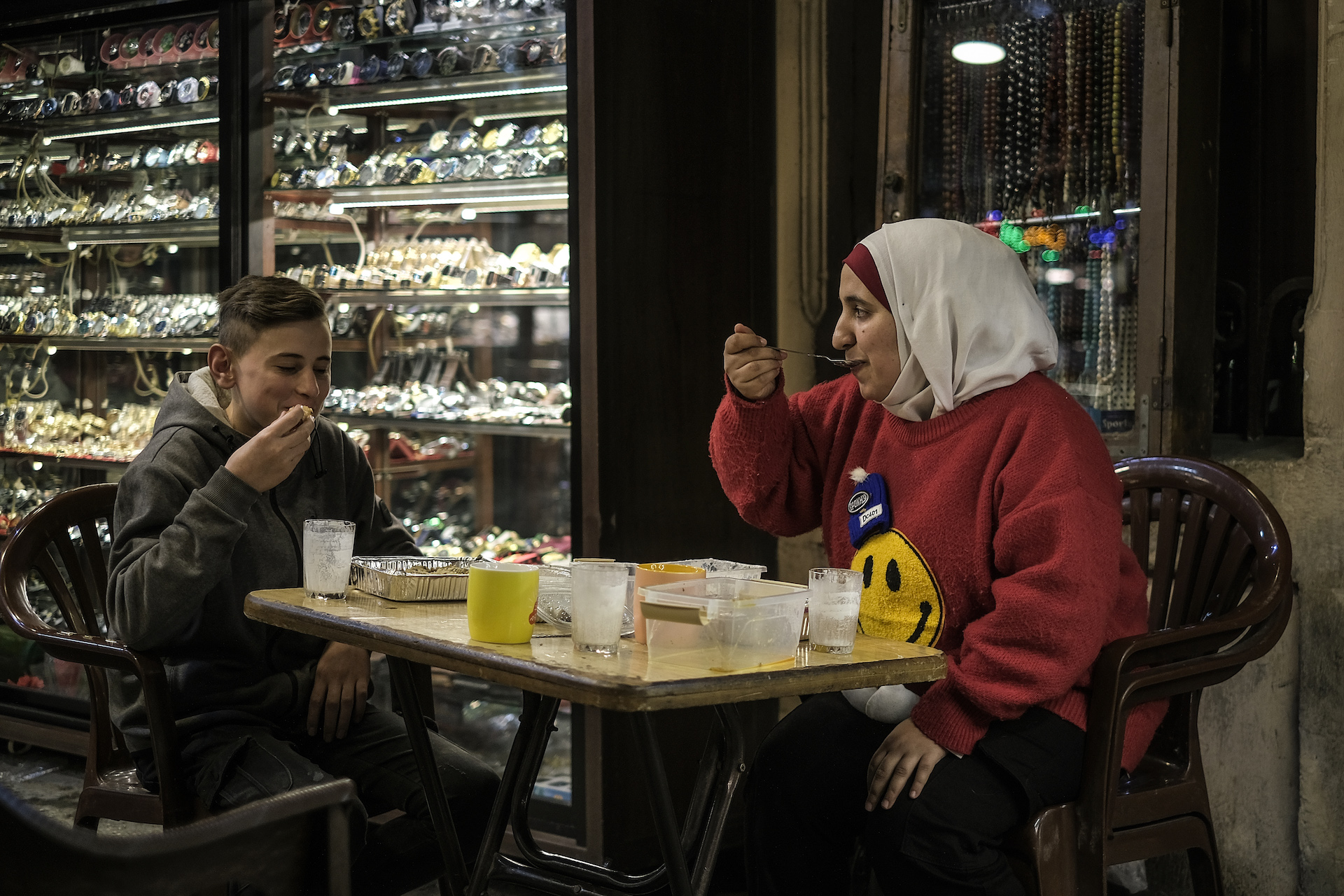 A jewelry shop supervisor and kid barber share their iftars as they keep their shops open into suhour hours. (Credit: João Sousa/L'Orient Today)
A jewelry shop supervisor and kid barber share their iftars as they keep their shops open into suhour hours. (Credit: João Sousa/L'Orient Today)
In Tripoli, home to some of Lebanon’s lowest-income residents well before the crisis, the social fabric depends on NGOs and some individual charities as the working class struggles to keep up with a developing economy that completely excludes them. On top of this, notoriously high Ramadan prices on food add an extra layer of deprivation.
“Richness is an accumulation,” adds the professor. “When crises hit, the rich don’t suffer. They know how to maneuver in a way that often turns the situation to their benefit.”
This paradox is especially visible in Tripoli as the region is home to some of Lebanon’s richest, who have doubled down on iftar invites in flashy restaurants only minutes away from families nibbling on leftovers.
Scaling market
Hussein Hammoud’s age-old bakery near the entrance of the rundown neighborhood of Beb al-Ramel finds that he can only keep customers by selling kaak at a competitive price of LL10,000. “He has the cheapest kaak in town!” belts one of the bakers, drunk on the smell of fresh bread. He throws another batch of round dough into a domed oven glowing red.
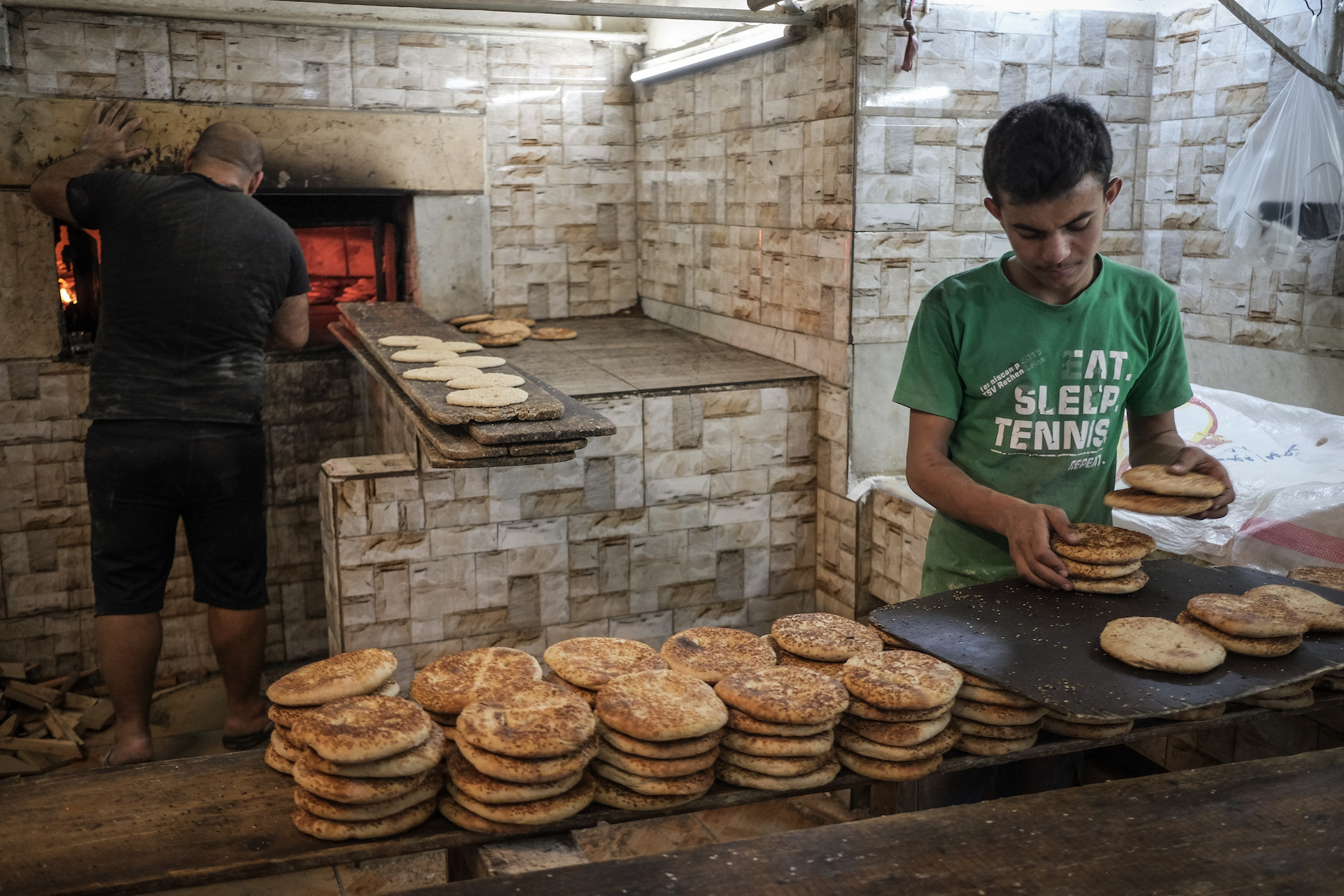 Hussein Hammoud’s bakery bustles at the 6 p.m. iftar rush hour. (Credit: João Sousa/L'Orient Today)
Hussein Hammoud’s bakery bustles at the 6 p.m. iftar rush hour. (Credit: João Sousa/L'Orient Today)
“The prices are constantly getting higher, and we’ve just accepted it and are always finding ways to adapt,” says Hammoud, supervising the store.
Near the clock tower, a father of two selling falafel laughs in disbelief when he admits that he sold his and his wife’s phones a few days before the start of the holy month for extra capital to spend on food this Ramadan.
His wife Mona is especially upset about losing the photos of iftar tables from previous years and the way she used to decorate the inside of her home.
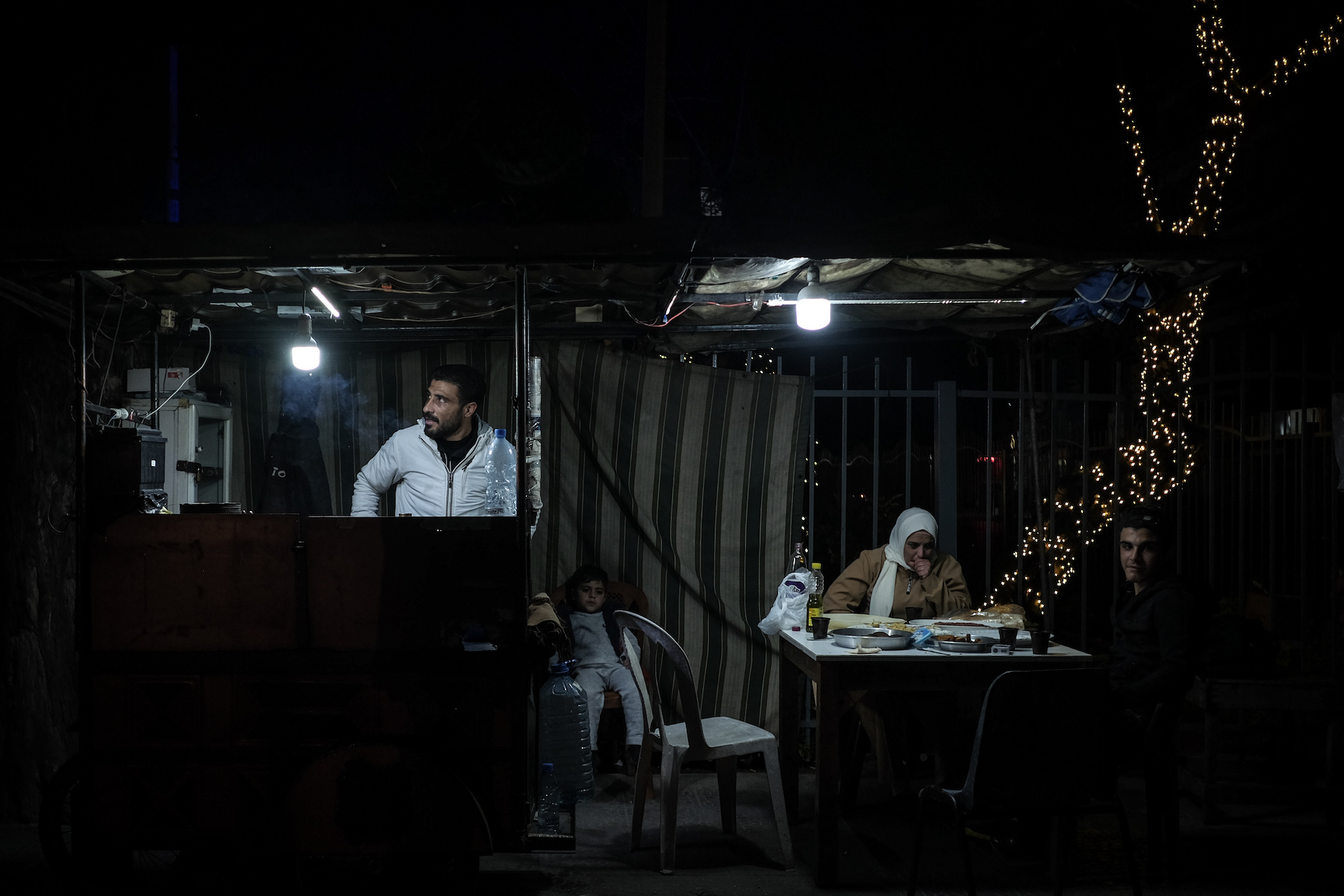 Mona and her husband eat under the light of their falafel stand. (Credit: João Sousa/L'Orient Today)
Mona and her husband eat under the light of their falafel stand. (Credit: João Sousa/L'Orient Today)
'Aid culture'
In Taynal Mosque near a public cemetery, a dozen volunteers wear green vests and smile as they scoop mounds of rice into plastic tupperware and wish a blessed Ramadan to the hundreds of families visiting to collect a free iftar meal.
Enabled through the donations of mosque regulars, the food bank started two years into the national crisis. “But this year, donations run scarce as most find themselves giving to families in Gaza instead,” remarks organizer Hajj Marwan Khawleh, called Bou Omar by the crew.
His co-volunteer and licensed social worker Sami Marroun explains how the mosque is helping feed a record-breaking average of 300 families a day this Ramadan. The aid — albeit appreciated — is still not making a dent in what he says are rising illiteracy levels in the city, keeping the population beneath the poverty line.
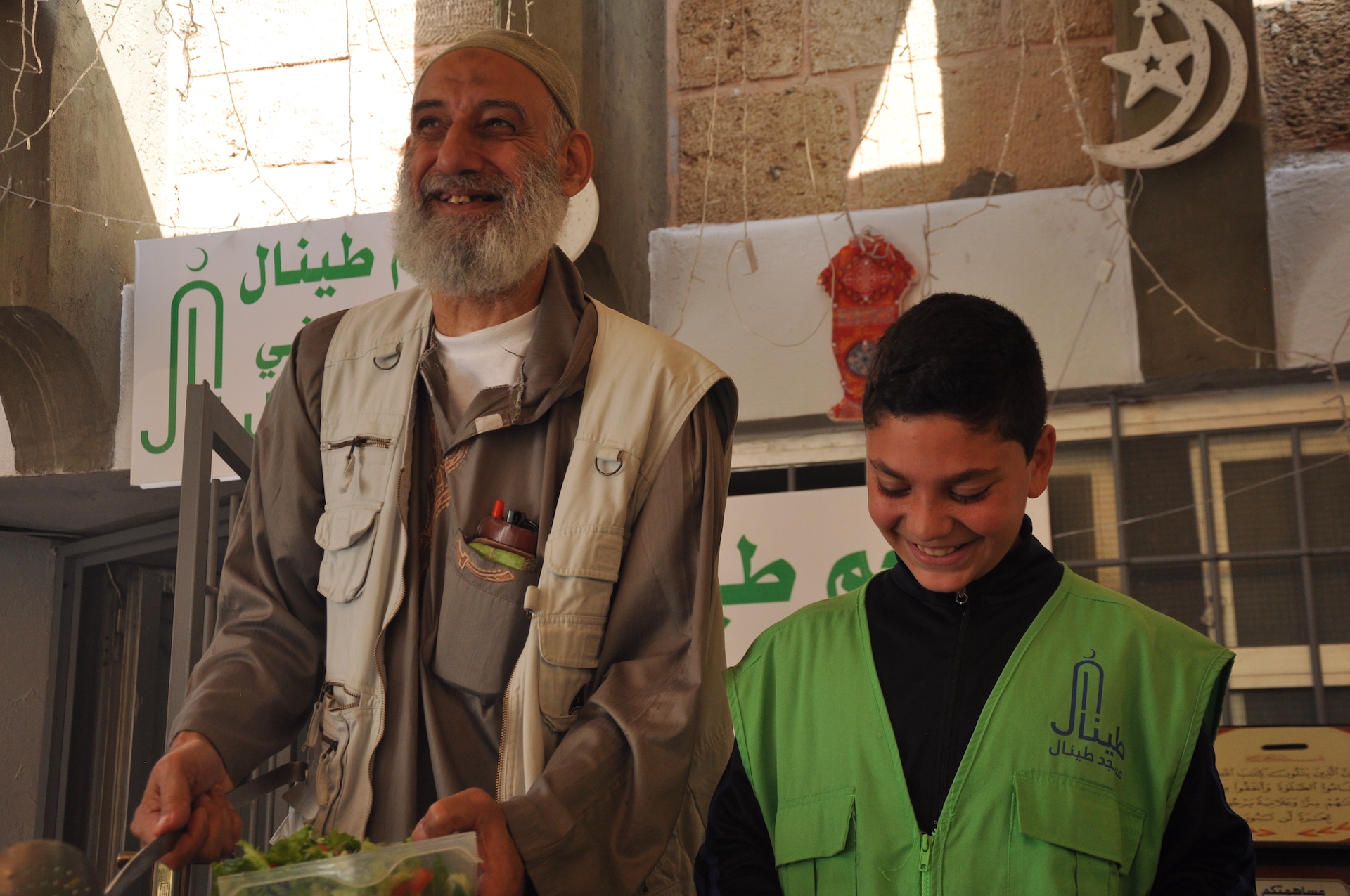 Volunteers from all walks of life come together to distribute free iftar meals at Taynal mosque. (Credit: Siraj Hasan/L'Orient Today)
Volunteers from all walks of life come together to distribute free iftar meals at Taynal mosque. (Credit: Siraj Hasan/L'Orient Today)
“Giving food and aid to the poor has never made them any richer,” argues Mansour, adding that reliance on NGOs in Lebanon and especially Tripoli stumps the possibility of real economic progression.
Amid the gap, aid campaigns become trendy in Ramadan. During the holy month, Tripoli residents often start their own giving initiatives such as Hajj Osama Libdi’s personal, eponymous meal bank funded by a group of Lebanese expats and tucked in the souk walls.
Shy incomers avoid the camera as they clot around the tight entrance of his home waiting for a package of mansaf, fatayer and water.
But neighboring shopkeepers question the honesty of such endeavors that only take place once a year. “If people really wanted to help, they’d actually organize the aid instead of just doing whatever they wanted,” one tells L’Orient Today. “Everyone wants to distribute food, but what about diapers? Medicine?”
Sundown
Keeping the promise to his sick mother that he’ll be home an hour before iftar, Adam, the teenage licorice drink shopper, wanders back from Beb al-Ramel still clutching onto the bag of sharab al-sous. He takes the long way home, swaying with the motion of the juice around the stone-lined neighborhood adorned with blue windows.
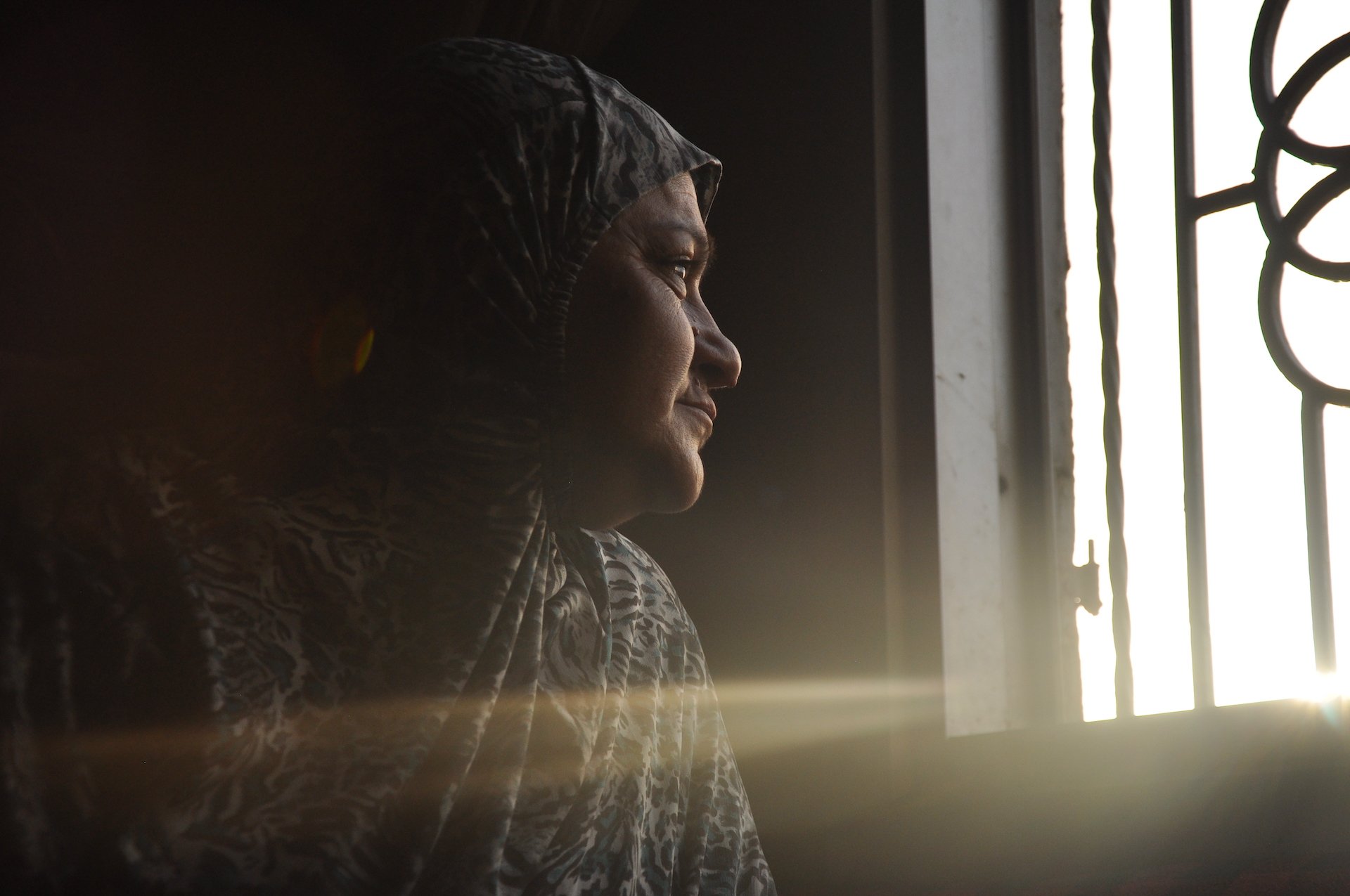 Nawzat stares out the window as she waits for her son to come home. (Credit: Siraj Hasan/L'Orient Today)
Nawzat stares out the window as she waits for her son to come home. (Credit: Siraj Hasan/L'Orient Today)
“I love Ramadan because I can always count on Adam obeying his curfew,” says the 55-year-old asthmatic, sitting on the couch she has been tethered to for years.
The sounds of sizzling sambousek being fried from the kitchen permeate the quaint living room just a thin wall away. “Akh,” his father Salim arrives from work with a sigh.
The aging head of the house hoards intense anxiety about securing the bare necessities in what he feels is a “constantly worsening situation.” Nonetheless, he refuses to lean on charity and would much rather eat at the hands of his daughter-in-law, who gradually brings out the same array of vegetarian hot dishes. She sets them out on the low living room table as the thirsty family keeps the window open to hear the maghrib prayers.
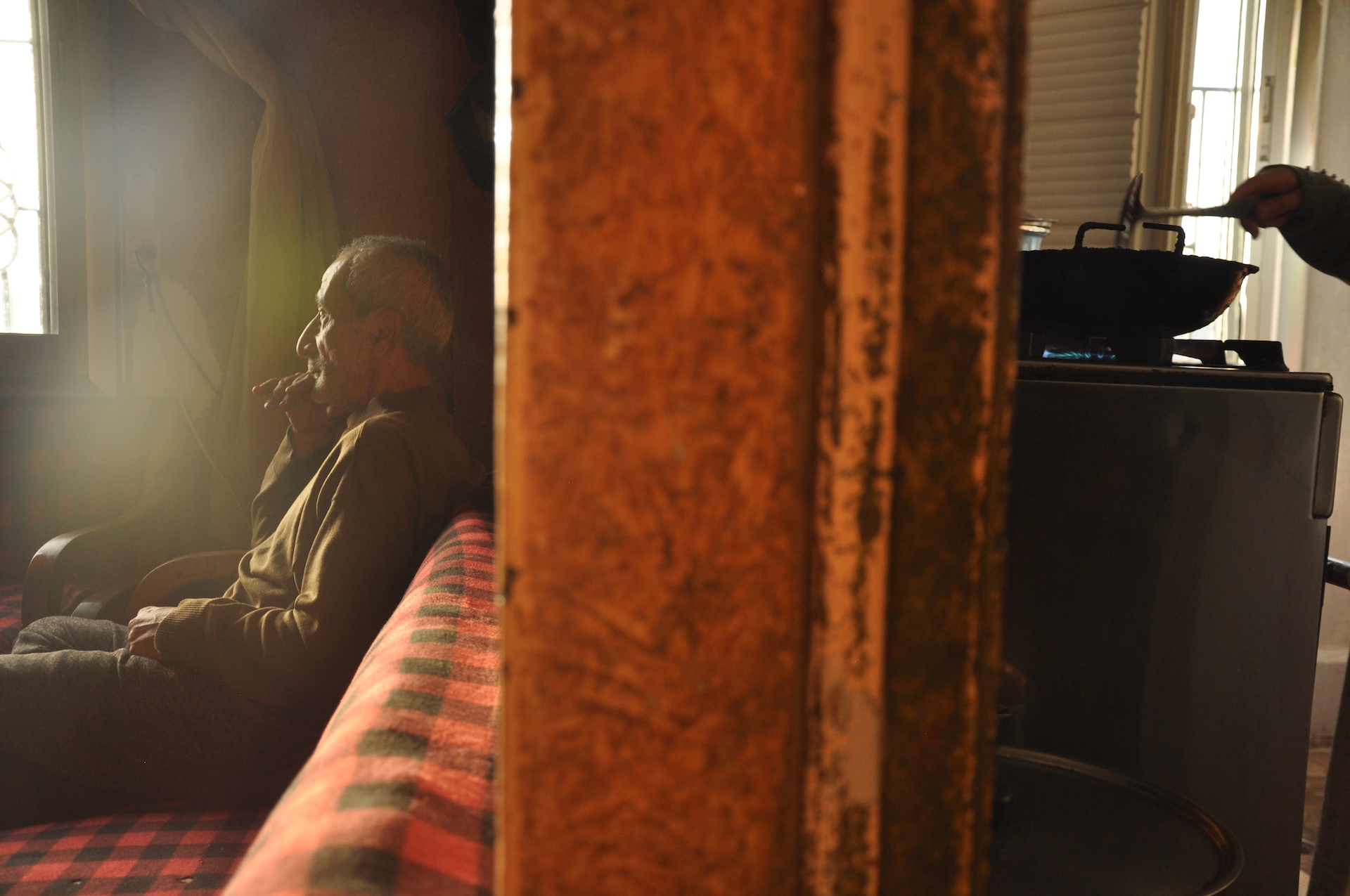 Salim silently waits for the sun to set. (Credit: Siraj Hasan/L'Orient Today)
Salim silently waits for the sun to set. (Credit: Siraj Hasan/L'Orient Today)
“That’s the athan,” Adam budges.
“No it isn’t,” his older brother Mohammad replies, hearing the distant mosques share some introductory words.
“Yes it is…oh right it’s not,” he laughs.
“Ah there it is!”
“No. Just wait.”
The two boys share a smirk as a symphony of overlapping voices belt from the tops of hundreds of mosques, while Salim stands to pray. The songs simmer as the room is abruptly seized by the munching noises as they break the day’s fast.